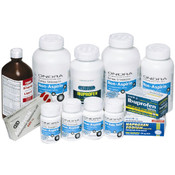skip to main |
skip to sidebar
Bipolar disorder is a complex psychiatric disorder and is considered to be an important cause of worldwide disability. Mood stabilizers are the primary pharmacological intervention, both in the treatment of acute episodes and in prophylaxis. There is, however, mounting evidence that dietary supplementation with omega-3 fatty acids may be beneficial in psychiatric conditions, particularly those involving disturbances of mood.
A recent review of almost 100 medical studies examining the current level of evidence regarding the efficacy of omega-3 fatty acid supplementation in improving bipolar disorder symptoms by researchers of the Columbia School of Nursing in New York, shows that omega-3 fatty acids in addition to prescribed medication, may benefit patients. The reviewers identified seven relevant studies including 230 patients diagnosed with bipolar disorder who received, in addition to their prescribed medication, omega-3 fatty acid supplementation for between 4 and 52 weeks. Based on the outcome of these studies, they researchers concluded that supplementation was effective in more than half of the selected studies, demonstrating a statistically significant improvement in bipolar disorder symptoms.
The review conducted by Teresa Turnbull and colleagues and was published in the October 2008 issue of the Archives of Psychiatric Nursing (Arch Psychiatr Nurs 2008; 22: 305-311).EPA and DHA
The researchers confirmed that patients using an omega-3 combination of eicosapentaenoic acid (EPA) and docosahexanoic acid (DHA) demonstrated a statistically significant improvement in bipolar symptoms, whereas those using a single component of either EPA or DHA did not.
Benefit explained
The effects of omega-3 fatty acid supplementation can be explained by the fact that omega-3 fatty acids exert an inhibitory effect on the cell signaling pathway which is thought to be very similar to the mechanism of action of commonly prescribed mood stabilizers. Patient adherence
Adherence to treatment can be a challenge for any patient diagnosed with a chronic disease requiring daily medication. This is not different for patients taking mood stabilizers. Side effects may often lead to patients discontinuing their medication, leading to inadequate medication.and treatment failures. ‘The question that researchers of omega-3 and bipolar disease are asking is whether supplementation with omega-3 can support the effect of prescription mood stabilizers in symptom reduction, which may, in turn, reduce dosing requirements, untoward side effects, and nonadherence,’ the researchers write in the October issue of Archives.
Improvement with omega-3 fatty acids
In reviewing the available data, the researchers identified that most patients diagnosed with bipolar disease continued their usual treatment, which included psychotropic medication, psychological therapy, or both. Overall, they reported that four of the seven studies showed a statistically significant improvement with omega-3 fatty acids supplementation in bipolar symptoms using screening tools and rating scales measure mental health symptoms. These scales include Young Mania Rating Scale, Hamilton Rating Scale for Depression, Clinical Global Impression Scale, and the Inventory of Depressive Symptomatology.In conclusion, the researchers comment that ‘Due to its benign side effect profile and some evidence supporting its usefulness in bipolar illness, … omega-3 supplementation… may be a helpful adjunct in the treatment of selected patients.’More study required
A different systematic Cochrane database review, studying the efficacy of omega-3 fatty acids as either a monotherapy or an adjunctive treatment for bipolar disorder by Montgomery and Richardson of the, Centre for Evidence-Based Intervention of the University of Oxford, also concluded that various studies confirm positive effects of omega-3 fatty acids as an adjunctive treatment for depressive but not manic symptoms in bipolar disorder. But Montgomery and Richardson believe that these findings must be regarded with caution owing to the limited data available and that, in the treatment of bipolar disorder [the current results] are insufficient for us to draw definite conclusions that can guide clinical practice’.
In their conclusion, they confirm that although omega-3 fatty acids may be beneficial, there is an acute need for well-designed and executed randomized controlled trials.For more information about Omega-3 fatty acids, visit Vitaelin Nutraceuticals at http://vitaelinhealthcenter.com.
Sources- Turnbull T, Cullen-Drill M, Smaldone A. Efficacy of omega-3 fatty acid supplementation on improvement of bipolar symptoms: a systematic review. Arch Psychiatr Nurs. 2008 Oct;22(5):305-11.
- Montgomery P, Richardson AJ. Omega-3 fatty acids for bipolar disorder. Cochrane Database Syst Rev. 2008 Apr 16;(2):CD005169.
Statin should not be considered for patients with heart failure (HF) of non-ischemic etiology, because lipid (cholesterol) lowering drugs do not translate into any clinically meaningful benefit for patients with heart failure (HF).
This is one of the unexpected outcomes from a large scale Italian study (Gruppo Italiano per lo Studio della Sopravvivenza nell'Infarto Miocardico Heart Failure or GISSI-HF study) involving 6,975 patients with New York Heart Association (NYHA) class II-IV HF of any cause and with any left ventricular ejection fraction who were randomized to receive daily supplementation of omega-3 fatty acids 1 g (805-882 mg eicosapentaenoic acid and docosahexaenoic acid in the average ratio 1:1.2) or placebo. In addition, 4,574 patients of the same group were also randomized to receive Crestor, (rosuvastatin calcium, 10 mg daily, Astra Zeneca) or placebo.
Trial design
The GISSI-HF trial was designed to investigate the effects of omega-3 fatty acids and statin therapy on mortality and morbidity in patients with chronic heart failure (HF).
Trial results
The results of this trial were presented by dr Luigi Tavazzi of the Fondazione Policlinico San Matteo, Pavia in Italy during the European Society of Cardiology (ESC) Congress 2008 in Munich, Germany and simultaneously published in The Lancet (1, 2)
Based on the results of the GISSI-HF study, the investigators concluded that the prescription of Crestor, which is indicated to reduce elevated total cholesterol, LDL-C, ApoB, non-HDL-C and triglyceride levels and to increase HDL-C in patients with primary hyperlipidemia and mixed dyslipidemia, or any statin to patients with heart failure (HF) of non-ischemic etiology should not be considered. The primary reason for their conclusion is that the use of the lipid (cholesterol-) lowering drugs does not translate into any clinically meaningful benefit for patients with heart failure (HF). The data showed that 29% of people taking Crestor died from any cause against 28% of those given a placebo. In other words, patients given Crestor proved just as likely to die early or be admitted to hospital with cardiovascular problems as those on standard therapy alone. Therefore, the investigators concluded that physicians can confidently stop statins in patients already taking them if convinced of the drug's futility or if they are concerned over multiple drug use. On the other hand doctors may be reassured that they can safely use statins in this population.
This is the second clinical trial for heart failure in which Crestor failed, suggesting that statins don't improve survival in patients with the chronic heart condition.
CORONA-study
The conclusions this study confirm the results of another medical study, the CORONA- trial (Controlled Rosuvastatin Multinational Trial in HF), published in 2007 in the New England Journal of Medicine, which researched the effect of Crestor in older patients (averaging 73 years of age) with moderate to severe systolic heart failure of ischemic origin who had already received extensive treatment with other drugs for cardiovascular disease (4). Although Crestor reduced LDL-C (low density-lipoprotein) and C-reactive protein (CRP), it had no significant effect on cardiovascular outcomes as measured by the primary endpoint composite of cardiovascular death, nonfatal myocardial infarct or stroke. The investigators in this study failed to find any benefit from statin treatment in this patient population and concluded that ‘statins as a class may not be efficacious in patients with ischemic left ventricular systolic dysfunction who are already receiving evidence-based therapy for heart failure (HF)’.
The CORONA-trial, presented and published in November 2007, included only patients with coronary heart disease, whereas just 40% of patients in GISSI-HF had ischemic HF. After considering the results of both trials, the investigators conclude that the cholesterol-lowering effects of statins do not reduce ischemic events in patients with heart failure and that the apparent pleiotropic effects of statins does not influence HF development (5).
The outcome of the CORONA-trial showed that treatment with Crestor had no significant effect on cardiovascular outcomes. However, it did significantly reduce the number of hospitalizations from cardiovascular causes and from heart failure (HR).
Commenting on the results of both trials, dr Gregg Fonarow of the of the Ahmanson-UCLA (University of California) Cardiomyopathy Center in Los Angeles, USA said that ‘these two well-conducted clinical trials establish that, although statin therapy lowers concentrations of LDL-C, is well tolerated and seems reasonably safe, it does not produce meaningful improvements in survival in patients with chronic heart failure.’(3)Sources - GISSI-HF investigators. Effect of n-3 polyunsaturated fatty acids in patients with chronic heart failure (the GISSI-HF trial): a randomized, double-blind, placebo-controlled trial. Lancet 2008; DOI: 10.1016/S0140-6736(08)61241-6. Available online at: http://www.thelancet.com.
- GISSI-HF investigators. Effect of rosuvastatin in patients with chronic heart failure (the GISSI-HF trial): a randomized, double-blind, placebo-controlled trial. Lancet 2008; DOI: 10.1016/S0140-6736(08)61241-6. Available online at: http://www.thelancet.com.
- Fonarow GC. Statins and n-3 fatty acid supplementation in heart failure. Lancet 2008; DOI: 10.1016/S0140-6736(08)61239-8. Available online at: http://www.thelancet.com.
- Kjekhus J, Apetrei E, Barrios V, et al. Rosuvastatin in older patients with systolic heart failure. N Engl J Med 2007; DOI: 10.1056.nejmoa0706201. Available online at: http://www.nejm.org
- Hjalmarson Å Controlled Rosuvastatin Multinational Trial in Heart Failure (CORONA)-Results of an outcomes trial in patients with ischemic heart disease and heart failure. American Heart Association 2007 Scientific Sessions; November 5, 2007; Orlando, FL, Late-breaking clinical trials 2.
Good news: taking daily omega-3 fatty acids supplements (n-3 polyunsaturated fatty acids or PUFAs) may improve survival prospects and reduce mortality among patients with chronic heart failure (HF).
This is one of the unexpected outcomes from a large scale Italian study (Gruppo Italiano per lo Studio della Sopravvivenza nell'Infarto Miocardico Heart Failure or GISSI-HF study) involving 6,975 patients with New York Heart Association (NYHA) class II-IV HF of any cause and with any left ventricular ejection fraction who were randomized to receive daily supplementation of omega-3 fatty acids 1 g (805-882 mg eicosapentaenoic acid and docosahexaenoic acid in the average ratio 1:1.2) or placebo. In addition, 4,574 patients of the same group were also randomized to receive Crestor, (rosuvastatin calcium, 10 mg daily, Astra Zeneca) or placebo.
Trial design
The GISSI-HF trial was designed to investigate the effects of omega-3 fatty acids and statin therapy on mortality and morbidity in patients with chronic heart failure (HF).
Trial results
The results of this trial, boosting the health-giving reputation of omega-3 fatty acids fish oil supplementation, were presented by dr Luigi Tavazzi of the Fondazione Policlinico San Matteo, Pavia in Italy, during the European Society of Cardiology (ESC) Congress 2008 in Munich, Germany and simultaneously published in The Lancet (1,2).
The investigators conducting the trial were especially glad to report positive results for patients with chronic heart failure (HF), an exceptionally difficult to treat condition in which the heart struggles to pump blood effectively, which causes shortness of breath and other serious problems. They found that supplementation with omega-3 fatty acids greatly benefitted this group of patients.
Patients were followed for almost four years (average 3.9 years). The supplementation with omega-3 fatty acids resulted in a 1.8% absolute risk reduction, which translated into a 9% reduction of mortality. The results also show a 2.3% absolute reduction in all-cause death or hospital admission for cardiovascular reasons, which translated in an 8% reduction of admission to the hospital for cardiovascular causes.
‘Real world meaning’
Translating these percentages to ‘real world meaning’, the chairperson of the GISSI-HF steering committee, dr. Tavazzi, explained that the absolute risk reductions achieved with omega-3 means that 56 patients would need to be treated over a 4-year period to prevent one death, while 44 would need to be treated to avoid a death or a hospital admission for cardiovascular causes.
In his conclusion he said that ‘Although this moderate benefit was smaller than expected, we should note that it was obtained in a population already treated with various recommended therapies, was consistent across all the predefined subgroups, and was further supported by the findings of the per-protocol analysis.’
Benefits after 2 year
An interesting aspect of the study is that the benefits of supplementation with omega-3 fatty acids only became clear after about 2 years of treatment. Commenting on this remarkable aspect, dr Michel Komajda of the Pitie Salpetriere Hospital and the Université Pierre et Marie Curie, in Paris, France, one of the other investigators in this trial, explained that ‘Mortality curves for treated and placebo groups only started to diverge after two years of follow-up’.
He further explained that while current European and U.S. treatment guidelines focus on the role of omega-3 in preventing heart disease wider guidance to include treating heart failure could be warranted.’ The benefit was statistically significant and at present physicians have little further to offer patients with heart failure. Therefore, I am sure that those of us who have responsibility for drawing up the next CHF guidelines will pay a lot of attention to the results of this trial.’
This sentiment was echoed by dr Gregg Fonarow of the of the Ahmanson-UCLA (University of California) Cardiomyopathy Center in Los Angeles, USA. In an editorial in The Lancet (3) dr Fonarow stated that despite the fact that ‘many questions remain about the mechanism of action, optimum dosing, and formulation, supplementation with n-3 polyunsaturated fatty acids (omega-3 fatty acids) should join the short list of evidence-based life-prolonging therapies for heart failure (HF).’
Clear benefits of omega-3 fatty acids
Omega-3 fatty acids have in the past been linked to a range of health benefits, including reducing the risk of heart attacks, strokes, Alzheimer's disease and depression. One explanation is that omega-3 fatty acids are thought to help by stabilizing the electrical signals of the heart, as well as reducing blood fat levels. Furthermore, researchers believe that omega-3 fatty acids could possibly exert favorable effects on inflammatory processes, such as reductions in endothelial activation and cytokine production, as well as influence platelet aggregation, blood pressure, heart rate, ventricular function, and autonomic tone.The advantage of omega-3 fatty acids supplementation is that it is cheap, well-tolerated and does not interfere with other medications, making it an attractive option for patients with chronic heart failure (HF) even if the clinical benefits are relatively moderate. This advantage was confirmed by dr Tavazzi who spoke of an ‘Effective, safe, simple, and cheap’ treatment option.
Long term effects
The GISSI-HF study showed that long term treatment with low-dose omega-3 fatty acids was associated with a significant reduction of total mortality of 21% in patients who survived a recent myocardial infarct (starting treatment within 3 months from symptom onset). The analysis of the causes of death showed that, among all cardiac causes, the most affected by omega-3 fatty acids was sudden cardiac death. Other experimental, epidemiological, as well as small size human studies confirm these findings and support the hypothesis that omega-3fatty acids can exert antiarrhythmic or antifibrillatory effects.This conclusion can be relevant for heart failure patients because nearly half of the deaths of patients with chronic heart failure (HR) are classified as sudden cardiac deaths. Analysis of the trial data showed that in patients with left ventricular dysfunction or heart failure enrolled in the trial, the effects of omega-3 fatty acids on all-cause and sudden mortality were similar to those observed in the total population of the trial.
The researchers believe that findings of this study should also be taken as a message to the public to eat more fish to keep their hearts healthy.Official study title: A Large Scale Clinical Trial Testing the Effects of n-3 PUFA and Rosuvastatin on Mortality-Morbidity of Patients With Symptomatic Congestive Heart Failure
For more information about omega-3 fatty acids, visit Vitaelin Nutraceuticals at http://vitaelinhealthcenter.com/
Sources
- GISSI-HF investigators. Effect of n-3 polyunsaturated fatty acids in patients with chronic heart failure (the GISSI-HF trial): a randomized, double-blind, placebo-controlled trial. Lancet 2008; DOI: 10.1016/S0140-6736(08)61241-6. Available online at: http://www.thelancet.com.
- GISSI-HF investigators. Effect of rosuvastatin in patients with chronic heart failure (the GISSI-HF trial): a randomized, double-blind, placebo-controlled trial. Lancet 2008; DOI: 10.1016/S0140-6736(08)61241-6. Available online at: http://www.thelancet.com.
- Fonarow GC. Statins and n-3 fatty acid supplementation in heart failure. Lancet 2008; DOI: 10.1016/S0140-6736(08)61239-8. Available online at: http://www.thelancet.com.
- Kjekhus J, Apetrei E, Barrios V, et al. Rosuvastatin in older patients with systolic heart failure. N Engl J Med 2007; DOI: 10.1056.nejmoa0706201. Available online at: http://www.nejm.org
- Hjalmarson Å Controlled Rosuvastatin Multinational Trial in Heart Failure (CORONA)-Results of an outcomes trial in patients with ischemic heart disease and heart failure. American Heart Association 2007 Scientific Sessions; November 5, 2007; Orlando, FL, Late-breaking clinical trials 2.






